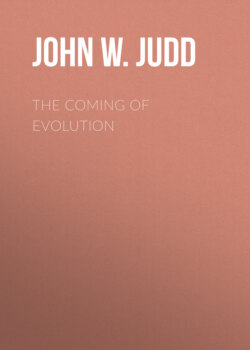Читать книгу The Coming of Evolution - John W. Judd - Страница 5
На сайте Литреса книга снята с продажи.
INTRODUCTORY
ОглавлениеTable of Contents
When the history of the Nineteenth Century—'the Wonderful Century,' as it has, not inaptly, been called—comes to be written, a foremost place must be assigned to that great movement by which evolution has become the dominant factor in scientific progress, while its influence has been felt in every sphere of human speculation and effort. At the beginning of the Century, the few who ventured to entertain evolutionary ideas were regarded by their scientific contemporaries, as wild visionaries or harmless 'cranks'—by the world at large, as ignorant 'quacks' or 'designing atheists.' At the end of the Century, evolution had not only become the guiding principle of naturalists, but had profoundly influenced every branch of physical science; at the same time, suggesting new trains of thought and permeating the language of philologists, historians, sociologists, politicians—and even of theologians.
How has this revolution in thought—the greatest which has occurred in modern times—been brought about? What manner of men were they who were the leaders in this great movement? What the influences that led them to discard the old views and adopt new ones? And, under what circumstances were they able to produce the works which so profoundly affected the opinions of the day? These are the questions with which I propose to deal in the following pages.
It has been my own rare good fortune to have enjoyed the friendship of all the great leaders in this important movement—of Huxley, Hooker, Scrope, Wallace, Lyell and Darwin—and, with some of them, I was long on terms of affectionate intimacy. From their own lips I have learned of incidents, and listened to anecdotes, bearing on the events of a memorable past. Would that I could hope to bring before my readers, in all their nobility, a vivid picture of the characteristics of the men to whom science and the world owe so much!
For it is not only by their intellectual greatness that we are impressed. Every man of science is proud, and justly proud, of the grandeur of character, the unexampled generosity, the modesty and simplicity which distinguished these pioneers in a great cause. It is unfortunately true, that the votaries of science—like the cultivators of art and literature—have sometimes so far forgotten their high vocation, as to have been more careful about the priority of their personal claims than of the purity of their own motives—they have sometimes, it must be sadly admitted, allowed self-interest to obscure the interests of science. But in the story we have to relate there are no 'regrettable incidents' to be deplored; never has there occurred any event that marred the harmony in this band of fellow-workers, striving towards a great ideal. So noble, indeed, was the great central figure—Charles Darwin—that his senior Lyell and all his juniors were bound to him by the strongest ties of admiration, respect and affection; while he, in his graceful modesty, thought more of them than of himself, of the results of their labours rather than of his own great achievement.
It is not, as sometimes suggested, the striking out of new ideas which is of the greatest importance in the history of science, but rather the accumulation of observations and experiments, the reasonings based upon these, and the writings in which facts and reasonings are presented to the world—by which a merely suggestive hypothesis becomes a vivifying theory—that really count in making history.
Talking with Matthew Arnold in 1871, he laughingly remarked to me 'I cannot understand why you scientific people make such a fuss about Darwin. Why it's all in Lucretius!' On my replying, 'Yes! Lucretius guessed what Darwin proved,' he mischievously rejoined 'Ah! that only shows how much greater Lucretius really was—for he divined a truth, which Darwin spent a life of labour in groping for.'
Mr. Alfred Russel Wallace has so well and clearly set forth the essential difference between the points of view of the cultivators of literature and science in this matter, that I cannot do better than to quote his words. They are as follows:—
'I have long since come to see that no one deserves either praise or blame for the ideas that come to him, but only for the actions resulting therefrom. Ideas and beliefs are certainly not voluntary acts. They come to us—we hardly know how or whence, and once they have got possession of us we cannot reject them or change them at will. It is for the common good that the promulgation of ideas should be free—uninfluenced by either praise or blame, reward or punishment.'
'But the actions which result from our ideas may properly be so treated, because it is only by patient thought and work that new ideas, if good and true, become adopted and utilized; while, if untrue or if not adequately presented to the world, they are rejected or forgotten[1].'[A]
Ideas of Evolution, both in the Organic and the Inorganic world, existed but remained barren for thousands of years. Yet by the labours of a band of workers in last century, these ideas, which were but the dreams of poets and the guesses of philosophers, came to be the accepted creed of working naturalists, while they have profoundly affected thought and language in every branch of human enterprise.
[A] For References see the end of the volume.
